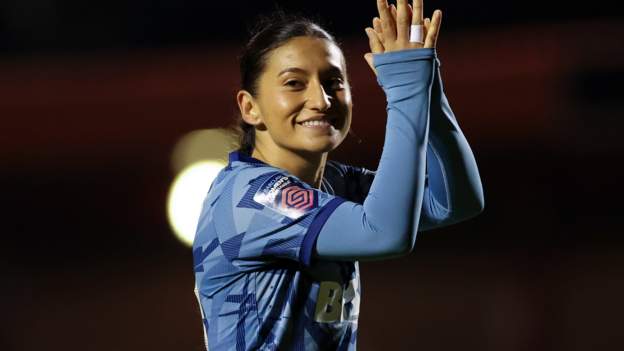Aston Villa is at the forefront of tackling the issue of diversity in women’s football, as evidenced by a recent training session for young girls featuring Fern Whelan, Ebony Salmon, and Maz Pacheco.
Despite women’s football facing criticism for its homogeneity, the Professional Footballers’ Association (PFA) is proactively assisting clubs like Aston Villa in promoting diversity. A recent examination of the sport highlighted the urgency to enhance diversity both on the field and in administrative roles.
Jonas Eidevall, Arsenal’s manager, acknowledged the need for diversity after a social media backlash over an all-white squad photo. Similarly, England’s manager Sarina Wiegman expressed her desire for the national team to better reflect societal diversity.
Sport Newes Center’s visit to an Aston Villa event, hosted by the PFA, revealed concerted efforts to advance diversity and equal opportunities within the Women’s Super League (WSL).
In 2021, black, Asian, and minority players constituted only about 10 to 15% of the WSL. Addressing this imbalance, Fern Whelan, the PFA’s inaugural women’s equality executive and former England international, collaborates with WSL clubs to organize training sessions for young girls in urban areas. These sessions, which also feature WSL stars like Khadija Shaw, Demi Stokes, Ebony Salmon, and Maz Pacheco, aim to inspire and offer role models from diverse backgrounds.
Whelan emphasizes the importance of representation and equal access to football for all young girls, regardless of their background. She envisions a sport where everyone feels included and sees a potential path for themselves.
Salmon and Pacheco’s participation in a training event at Villa’s academy in Birmingham, where about 60 young girls received coaching, is a testament to this vision. Salmon, reflecting on her own experiences, highlights the significance of having role models that young girls can relate to and aspire to become. Pacheco echoes this sentiment, stressing that football should be accessible to everyone, irrespective of their background.
Arsenal and Aston Villa are not alone in these efforts. The WSL as a whole is embracing diversity initiatives. Arsenal, for instance, collaborates with the PFA’s Asian Inclusion Mentoring Scheme, offering workshops for young South Asian players. Villa plans to host similar initiatives, focusing on grassroots diversity.
Carla Ward, Villa’s manager, asserts the club’s commitment to enhancing diversity, noting that the team already reflects a diverse composition. Pacheco, who also runs an independent football academy, sees positive trends in women’s football, with increased investment and interest leading to greater diversity.
Whelan is optimistic that by focusing on academy football and targeting urban areas, the sport can achieve greater diversity across all levels. She recalls a time when diversity was more prominent in women’s football, with influential figures like Rachel Yankey, Mary Phillip, and manager Hope Powell. Whelan believes that professionalization has somewhat diluted this diversity, but initiatives like Aston Villa’s can help reverse this trend.
Whelan underscores the PFA’s role in guiding clubs to enhance diversity and hopes that successful events at clubs like City, Arsenal, and Villa will inspire others. She acknowledges that the issue extends beyond race and ethnicity, encompassing socio-economic factors as well.
Salmon highlights the importance of continuous dialogue and criticism to ensure that the focus on diversity remains a priority. She advocates for persistent questioning and discussion to foster further growth in the sport’s diversity.
Frequently Asked Questions (FAQs) about Women’s Football Diversity
What is Aston Villa doing to promote diversity in women’s football?
Aston Villa, in collaboration with the Professional Footballers’ Association (PFA), is actively working to enhance diversity in women’s football. This includes organizing training sessions for young girls, especially in inner-city areas, and showcasing role models from diverse backgrounds in the Women’s Super League (WSL). Key figures like Fern Whelan, Ebony Salmon, and Maz Pacheco are involved in these initiatives.
How is the Women’s Super League addressing the issue of diversity?
The Women’s Super League (WSL) is tackling diversity issues by collaborating with clubs and the PFA to create more inclusive opportunities. This includes training and mentoring programs for young girls, particularly from minority backgrounds. The league is also focusing on representation by promoting diverse role models within the sport.
What role does the PFA play in promoting diversity in women’s football?
The Professional Footballers’ Association (PFA) plays a crucial role in promoting diversity in women’s football. They are actively involved in setting up programs and events that encourage participation from diverse groups. The PFA also works with clubs to implement strategies and initiatives that increase inclusivity in the sport.
Who are some of the key figures in Aston Villa’s diversity initiatives?
Key figures in Aston Villa’s diversity initiatives include Fern Whelan, the PFA’s first women’s equality executive, and players Ebony Salmon and Maz Pacheco. These individuals are not only role models but also actively participate in training and mentoring young girls, demonstrating the club’s commitment to diversity.
How has the perception of diversity in women’s football changed recently?
There has been a growing awareness and recognition of the need for diversity in women’s football. Criticisms regarding the lack of diversity in teams have led to more focused efforts to address this issue. Clubs and associations are now more actively working towards creating a more inclusive and representative environment in the sport.
More about Women’s Football Diversity
- Aston Villa Women’s Team
- Professional Footballers’ Association (PFA)
- Women’s Super League (WSL)
- Diversity Initiatives in Football
- Fern Whelan Biography
- Ebony Salmon Profile
- Maz Pacheco Career Highlights

4 comments
Ebony Salmon and Maz Pacheco are real inspirations, glad to see them gettin involved in these initiatives. Shows that players can make a diffrence off the pitch too.
Fern Whelan’s doing an amazing job, her work is so important for young girls in the sport. Hope more clubs follow suit!
wow, its great to see clubs like Aston Villa taking a stand for diversity in womens football.. It’s about time!
i’m impressed with how the PFA and WSL are stepping up their game. More diversity = better football for everyone.